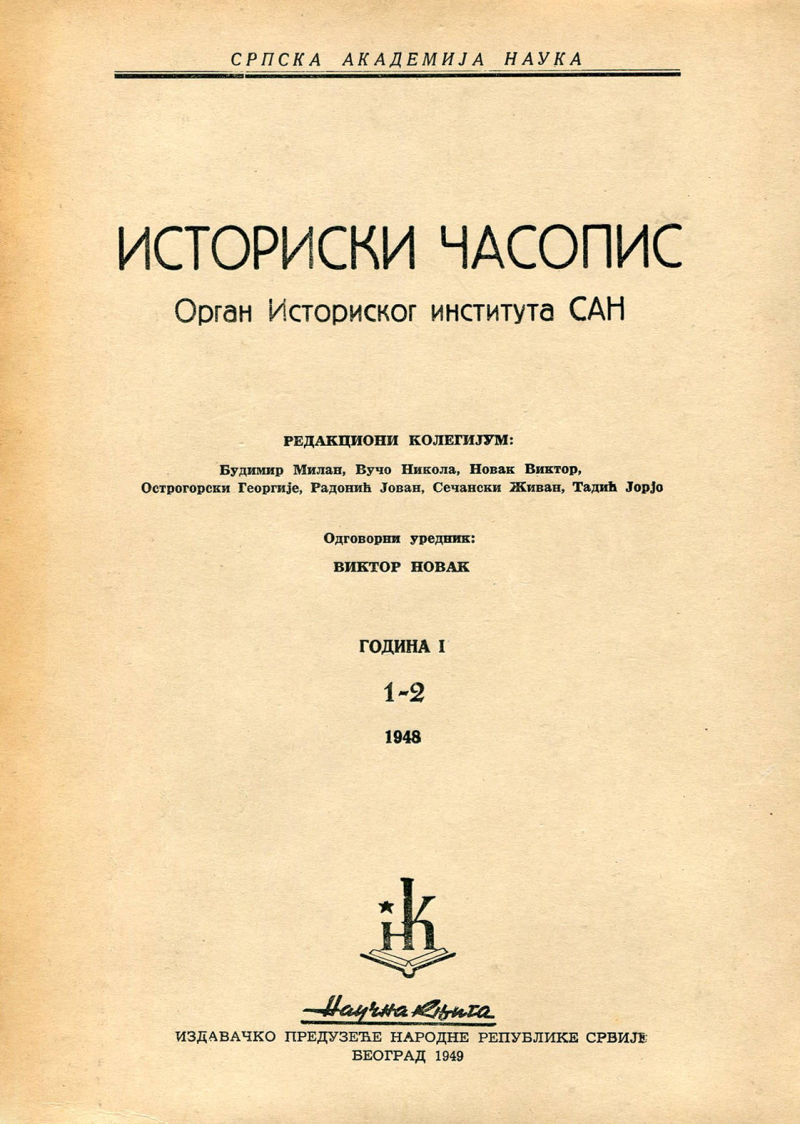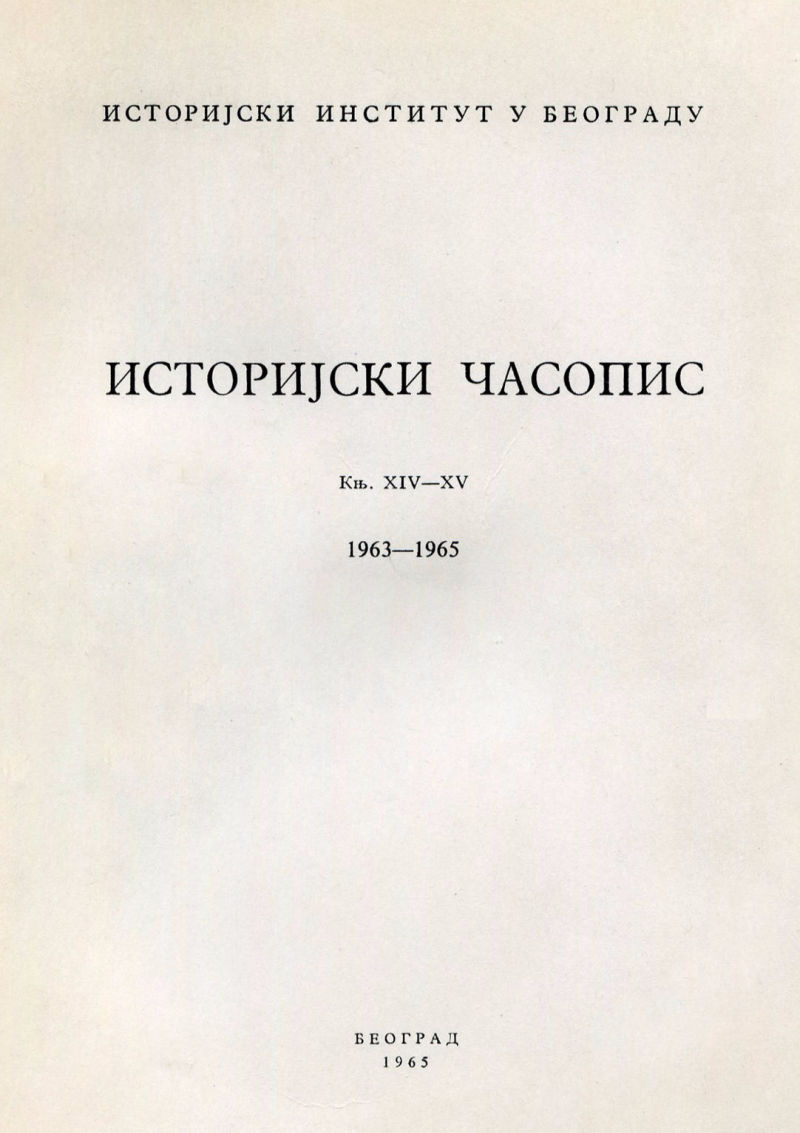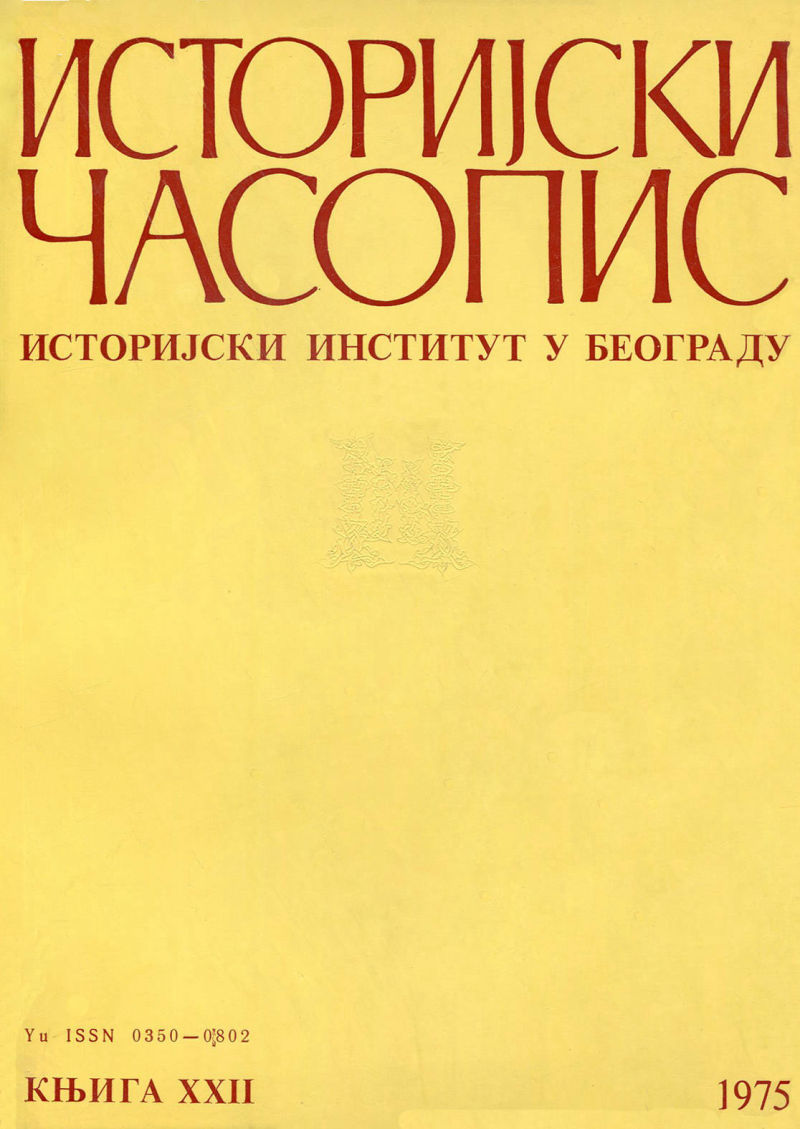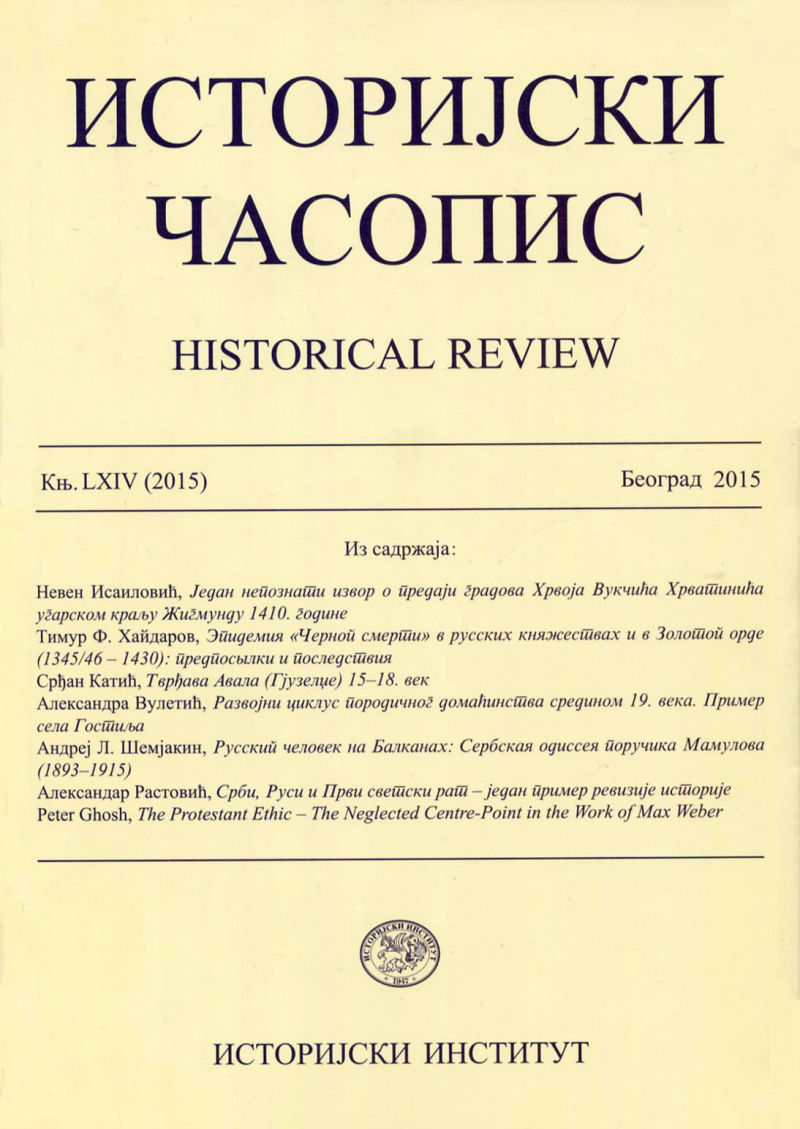



ISTORIJSKI ČASOPIS, the official journal of the Institute of History, has been published annually since 1948. It applies the policy of double blind peer review.
Istorijski časopis (Historical Review) publishes original, previously unpublished papers classified into the following categories: original research paper, research paper, scientific review paper, scientific critique and debate, scientific bibliography. It also publishes articles in the form of overviews and reports from scientific life.
The journal covers topics in the areas of history, auxiliary sciences of history and related humanities and social sciences, with a special emphasis on political, economic, social and cultural history of the Serbs and their links with South Slavic and other Balkan peoples. Chronological scope of the journal is limited to the period between early middle ages up until 1918 and the creation of the Kingdom of the Serbs, Croats and Slovens.
Papers may be written in Serbian and related South Slavic languages, English, Russian, German and French. Papers in Serbian are published in the Cyrillic script.
Istorijski časopis is issued once a year.
The journal is indexed in Scopus (Elsevier), ERIH PLUS list (European Reference Index for the Humanities and Social Sciences), CEEOL database (Central and Eastern European Online Library), EBSCO Historical Abstracts.
Istorijski časopis is an Open Access journal.
Papers published in the journal may be downloaded free of charge from the website of the journal and used in accordance with Creative Commons license – Attribution-NonCommercial-NoDerivs 4.0 International (https://creativecommons.org/licenses/by-nc-nd/4.0/).
Istorijski časopis does not charge Submission or APC (Article Processing Charge). The journal does not charge any fees at submission, reviewing, and production stages.
Editorial Board of Istorijski časopis:
academician Mihailo Vojvodić (Serbian Academy of Sciences and Arts),
Biljana Vučetić, PhD (Institute of History Belgrade) (ORCID: 0000-0003-4050-6391),
academician Jovanka Kalić (Serbian Academy of Sciences and Arts),
Srđan Katić (Institute of History Belgrade) (ORCID: 0000-0003-2412-0851)
Prof. Tamás Körmendi, PhD (Eötvös Loránd University, Institute of History, Budapest, Hungary), (ORCID: 0000-0002-6556-9068)
Prof. Angeliki Konstantakopoulou, PhD (University of Ioannina, Greece),
Miloš Ivanović, PhD (Institute of History Belgrade) (ORCID: 0000-0003-1917-2331)
Jelena Ilić Mandić, PhD (Institute of History Belgrade) (ORCID: 0000-0001-7172-6915)
Giuseppe Motta, PhD (Sapienza University of Rome, Italy), (ORCID: 0000-0002-6405-5380)
Konstantin Nikiforov, PhD (Institute for Slavic Studies, Russian Academy of Sciences, Moscow, Russia), (ORCID: 0000-0002-4436-5074)
Prof. Hatice Oruç, PhD (Faculty of Languages, History and Geography, Ankara University, Turkey), (ORCID: 0000-0003-2185-1640)
Vladeta Petrović, PhD (Institute of History Belgrade) (ORCID: 0000-0002-2420-0221)
Prof. Ilija Todev, PhD (Institute for Historical Studies, Bulgarian Academy of Sciences), (ORCID: 0000-0002-0165-8125)
Aleksandar Uzelac, PhD (Institute of History Belgrade) (ORCID: 0000-0003-0626-2928)
Prof. Lubomíra Havlíková, PhD (Institute of Slavonic Studies of the Academy of Sciences of the Czech Republic, Prague, Czech Republic),
Prof. Aleksandar Rastović, PhD, Editor in Chief (Institute of History Belgrade), (ORCID: 0000-0001-7066-4791)
* Ethics and Malpractice Statement (.pdf file)
Editorial Responsibilities
The editor-in-chief is responsible for deciding which articles submitted to Istorijski časopis will be published. He is guided by the editorial policy and constrained by legal requirements in force regarding libel, copyright infringement and plagiarism.
The editor must hold no conflict of interest with regard to the articles he considers for publication. If such conflict exists, the editorial board shall decide on the choice of reviewers and the fate of manuscripts. Since the identity of authors and reviewers is mutually unknown, the editor must warrant their anonymity.
The editor shall evaluate the manuscript based on its contents, without any racial, sexual/gender, religious, ethnic and political bias.
Unpublished materials disclosed in a submitted manuscript must not be used in an editor’s own research without the express written consent of the author.
Authors’ Responsibilities
Authors warrant that the manuscript represents their original contribution, that it has not been published before and is not considered for publication elsewhere.
Authors also warrant that following publication in Istorijski časopis, the manuscript will not be published in another publication in any language without the consent of the copyright holder.
Authors warrant that the rights of third parties will not be violated and that the publisher will not be held legally responsible should there be any claims for compensation.
Authors are exclusively responsible for the contents of their submissions and the validity of results, and must obtain permission from all involved parties to make the data public.
Authors wishing to include figures or text passages that have already been published elsewhere are required to obtain permission from the copyright holders and, when submitting their papers, to present evidence that such permission has been granted. Any material received without such evidence shall be assumed to originate from the authors.
Authors warrant that only those persons who significantly contributed to the submission are listed as authors.
Authors must comply with ethical standards relating to scientific-research work.
Authors warrant that the paper does not contain plagiarism.
Authors affirm that the article does not contain unfounded or unlawful claims and does not violate the rights of others.
When an author discovers a significant error in his/her own published work, he/she must promptly inform the editor or publisher, and cooperate with them so as to retract or correct the paper, or to otherwise indicate the error.
Reviewers’ Responsibilities
Reviewers are required to provide written, competent and unbiased feedback in a timely manner on the scholarly merits and the scientific value of the manuscript.
The reviewers assess manuscript for the compliance with the profile of the journal, the relevance of the investigated topic and applied methods, the originality and scientific relevance of information presented in the manuscript, the presentation style and scholarly apparatus.
Reviewers should alert the Editor to any well-founded suspicions or the knowledge of possible violations of ethical standards by the authors. Reviewers should recognize relevant published works that have not been cited by the authors and alert the Editor to substantial similarities between a reviewed manuscript and any manuscript published or under consideration for publication elsewhere, in the event they are aware of such. Reviewers should also alert the Editor to a parallel submission of the same paper to another journal, in the event they are aware of such.
Reviewers must not have conflict of interest with respect to the research, the authors and/or the funding sources for the research. If such conflicts exist, the reviewers must report them to the Editor without delay. Any selected referee who feels unqualified to review the research reported in a manuscript or knows that its prompt review will be impossible should notify the Editor without delay.
Reviews must be conducted objectively. Personal criticism of the author is inappropriate. Reviewers should express their views clearly with supporting arguments.
Any manuscripts received for review must be treated as confidential documents. reviewers must not use unpublished materials disclosed in submitted manuscripts without the express written consent of the authors. The information and ideas presented in submitted manuscripts shall be kept confidential and must not be used for personal gain.
Peer Review
The submitted papers are subject to the peer review process. The purpose of the peer review is to assist the editor and the editorial board to make the decision on whether the paper should be accepted or rejected, and to improve its quality through communication with authors. All papers undergo an anonymous reviewing process by two expert reviewers appointed by the editorial board. The identity of authors is not disclosed to reviewers and vice versa. For a paper to be published, both reviews must be positive. The authors who receive conditionally positive reviews are required to take into account the reviewers’ comments or, if they do not wish to do so, to withdraw their submissions. The author is required to send the amended paper to the journal within fifteen days after receiving the reviews. The reviewer should send the finished review within three weeks.
The choice of reviewers falls within discretionary rights of the editor and the editorial board. Reviewers must be knowledgeable about the subject area of the manuscript. They cannot be authors who recently published publications together (as co-authors) with any of the authors of the submitted paper.
The reviewer considering himself incompetent for the topic or the area that the manuscript deals with shall inform the editor thereof.
The review must be objective. The reviewers’ judgment must be clear and substantiated with arguments.
Any manuscripts received for review must be treated as confidential documents.
In the main review phase, the editor-in-chief sends the submitted paper to designated reviewers. The reviewers’ evaluation form contains a checklist to help reviewers cover all aspects that can decide the fate of a submission. In the final section of the form, reviewers must include their observations and suggestions aimed at improving the submitted manuscript. The secretary of the editorial board of Istorijski časopis sends the reviewers’ evaluation list to the reviewer.
During the entire process, reviewers act independently of one another and are not aware of each other’s identities.
The editorial board must ensure reasonable quality control for the reviews. In the case that authors have serious and grounded objections to the review, the editorial board will check whether the review is objective and meets academic standards. If doubts arise as to the objectivity or quality of the review, the editor will ask for the opinion of other reviewers.
Plagiarism
Plagiarism, i.e. assuming another’s ideas, words or other forms of creative expression and presenting them as one’s own, is serious violation of scientific ethics. Plagiarism may also involve copyright infringement, which is punishable by law.
Plagiarism includes the following:
- verbatim or almost verbatim quotation or intentional paraphrasing (with the aim to conceal plagiarism) parts of texts of other authors without clear acknowledgment of the source or marking the copied fragments (for instance, using quotation marks);
- copying equations, figures or tables from someone else’s papers without properly citing the source and/or without permission of the authors or copyright holders.
Please note that all submissions are thoroughly checked for plagiarism or auto-plagiarism.
Any paper which shows obvious signs of plagiarism will be automatically rejected.
If it is determined that a paper published in Istorijski časopis is plagiarism, the author will be requested to publish a written apology to the authors of the original work. Further cooperation with authors of plagiarised papers will be terminated.
Procedures for Dealing with Unethical Behavior
Anyone may inform the editors and/or Editorial Board at any time of suspected unethical behavior or any type of misconduct by giving the necessary information/evidence to start an investigation.
Investigation
- Editor-in-Chief will consult with the Editorial Board on decisions regarding the initiation of an investigation.
- During an investigation, any evidence should be treated as strictly confidential and only made available to those strictly involved in investigating.
- The accused will always be given the chance to respond to any charges made against them.
- If it is judged at the end of the investigation that misconduct has occurred, then it will be classified as either minor or serious.
Minor misconduct
Minor misconduct will be dealt directly with those involved without involving any other parties, e.g.:
- Communicating to authors/reviewers whenever a minor issue involving misunderstanding or misapplication of academic standards has occurred.
- A warning letter to an author or reviewer regarding fairly minor misconduct.
Major misconduct
The Editor-in-Chief, in consultation with the Editorial Board, and, when appropriate, further consultation with a small group of experts should make any decision regarding the course of action to be taken using the evidence available. The possible outcomes are as follows (these can be used separately or jointly):
- Publication of a formal announcement or editorial describing the misconduct.
- Informing the author’s (or reviewer’s) head of department or employer of any misconduct by means of a formal letter.
- The formal, announced retraction of publications from the journal in accordance with the Retraction Policy (see below).
- A ban on submissions from an individual for a defined period.
- Referring a case to a professional organization or legal authority for further investigation and action.
When dealing with unethical behavior, the Editorial Board will rely on the guidelines and recommendations provided by the Committee on Publication Ethics (COPE): http://publicationethics.org/resources/.
Retraction Policy
Articles that have been published shall remain extant, exact and unaltered as long as it is possible. However, very occasionally, circumstances may arise where an article is published that must later be retracted. The main reason for retraction is to correct the mistake while preserving the integrity of science; it is not to punish the author.
Infringements of rights of the publisher, copyright holders or author(s), infringements of professional ethical codes, such as multiple submissions, bogus claims of authorship, plagiarism, fraudulent use of data or the like require retraction of an article. Occasionally a retraction can be used to correct errors in submission or publication.
Standards for dealing with retractions have been developed by a number of library and scholarly bodies, and this practice has been adopted for article retraction by Istorijski časopis: in the electronic version of the retraction note, a link is made to the original article. In the electronic version of the original article, a HTML link is made to the retraction note where it is clearly stated that the article has been retracted. The original article is retained unchanged, save for a watermark on the PDF indicating on each page that it is “retracted.”
Open Access Policy
Istorijski časopis is an Open Access journal. Papers published in the journal may be downloaded free of charge from the website of the journal and used in accordance with Creative Commons license – Attribution-NonCommercial-NoDerivs 4.0 International (https://creativecommons.org/licenses/by-nc-nd/4.0/).
Istorijski časopis does not charge Submission or APC (Article Processing Charge). The journal does not charge any fees at submission, reviewing, and production stages.
Self-Archiving Policy
The journal allows authors to deposit the accepted, reviewed version of the article, and the final published PDF version in an institutional repository and/or non-commercial repositories, or to publish it on personal web pages (including social networking sites, such as ResearchGate, Academia.edu, etc.) and/or the website of the institution where they are employed, in accordance with Creative Commons Attribution-NonCommercial-NoDerivatives 3.0 Serbia (http://creativecommons.org/licenses/by-nc-nd/3.0/rs/) at any time after publication in the journal. The publisher, as the copyright holder, and source must be acknowledged and a HTML link must be made to the article’s DOI.
Copyright
Once the manuscript is accepted for publication, authors shall transfer the copyright to the Publisher. If the submitted manuscript is not accepted for publication by the journal, all rights shall be retained by the author(s).
Authors grant to the Publisher the following rights to the manuscript, including any supplemental material, and any parts, extracts or elements thereof:
- the right to reproduce and distribute the Manuscript in printed form, including print-on-demand;
- the right to produce prepublications, reprints, and special editions of the Manuscript;
- the right to translate the Manuscript into other languages;
- the right to reproduce the Manuscript using photo-mechanical or similar means including, but not limited to photocopy, and the right to distribute these reproductions;
- the right to reproduce and distribute the Manuscript electronically or optically on any and all data carriers or storage media – especially in machine readable/digitalized form on data carriers such as hard drive, CD-Rom, DVD, Blu-ray Disc (BD), Mini-Disk, data tape – and the right to reproduce and distribute the Article via these data carriers;
- the right to store the Manuscript in databases, including online databases, and the right of transmission of the Manuscript in all technical systems and modes;
- the right to make the Manuscript available to the public or to closed user groups on individual demand, for use on monitors or other readers (including e-books), and in printable form for the user, either via the internet, other online services, or via internal or external networks.
Authors retain the right to translate their contribution to another language, to use it for noncommercial purposes in publication which compiles their work, their doctoral dissertation or monograph study, as long as it remains stated that new work derives from a contribution published in Istorijski časopis. Authors grant to the publisher the right to publish the article, to be cited as its original publisher in case of reuse, and to distribute it in all forms and media. Full bibliographic information (authors, article title, journal title, volume, issue, pages) about the original publication must be provided and a link must be made to the article’s DOI in the form of the HTML link, i.e. URL address of the article’s initial publication.
The third parties can use the article in a way not covered by the editorial policy and Creative Commons Attribution-NonCommercial-NoDerivatives 3.0 Serbia (http://creativecommons. org/licenses/by-nc-nd/3.0/rs/) only if they obtain a written consent of the publisher, and such requests should be sent to electronic address of the Editorial Board at istoriјski.casopis@iib.ac.rs.
Disclaimer
The views expressed in the published works do not express the views of the Editors and Editorial Board. The authors take legal and moral responsibility for the ideas expressed in the articles. Publisher shall have no liability in the event of issuance of any claims for damages. The Publisher will not be held legally responsible should there be any claims for compensation.
Dear authors, please read and apply the Instructions for preparations of your papers.
* Instructions for Authors - English Language (.pdf file)
* Uputstvo za autore - srpski jezik (.pdf.file)
Dear authors, please read and fill in the Author’s Statement and the Copyright Assignment
Agreement.
* Author Statement (.pdf file)
* Copyright Assignment Agreement (.pdf file)
Free AI Website Creator